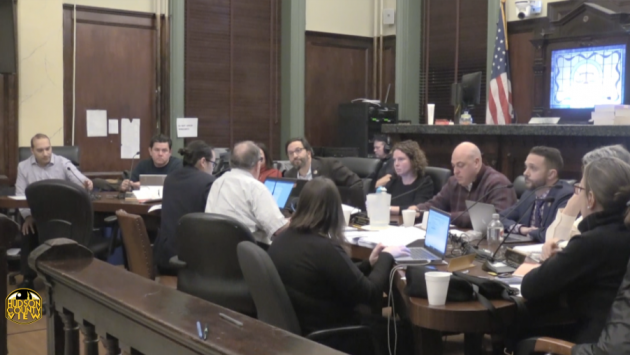The Hoboken City Council passed a controversial rent control reform ordinance on second reading after a fiery debate at last night’s meeting.
By Daniel Ulloa/Hudson County View
The measure was approved on first reading two weeks ago despite several tenants and landlords expressing dismay over the proposal: such as changing the initial base rent yet to October 1st, 1985 and reducing annual rent increases from 7.5 percent to 5 percent.
“I urge you all to support Hoboken renters and vote yes. These amendments will help us tenants,” noted Jenny Labendz, a member of the Rent Leveling & Stabilization Board who said she was speaking as a private citizen.
She cited the five percent Consumer Price Index (CPI) rent increase cap as a benefit.
“Some of these could be made stronger. Our rent control law includes hardship protection for landlords. Landlords cannot be hurt by rent control,” adding that there are also protections for landlords.
Former Councilman Tony Soares, who now works in real estate, who criticized the current rent control board.
“We need rent control. What I’m not in favor of is this incredible anti-landlord rent (control board),” real estate agent Tony Soares said.
He explained people must wait three to five months to get a board hearing, later contending that those taking over Hoboken are large corporate landlords gouging tenants.
Mile Square Taxpayers Association Executive Director Ron Simoncini explained he recently allied with noted tenant advocate Cheryl Fallick – a former rent board member.
The longtime political adversaries reached a truce on this issue and were recommending five amendments to the ordinance.
“We are committed to maintaining rent-controlled properties in Hoboken … We would hope that you vote no tonight,” Simoncini said.
He noted they have many years of experience in Hoboken housing policy from two different perspectives: “Our commitment is literally historic,” Simoncini declared to applause.
“Everything Simoncini said is true. The only right vote tonight is a no vote … There are problems in this ordinance. We know more about rent controls … than any one of you.”
A copy of the measure obtained by HCV calls for legal rent to be defined as rent permitted to be charged under the rent control ordinance, leaving rent control calculations up to the rent control office (with tenants able to receive the calculations upon request), and that a “base rent” cannot be increased in the event that it is greater than “legal rent” – among other things.
While several speakers, including April Harris, said they believed the intent of the ordinance was good, she stated that landlords “feel trapped by artificially low rents,” as well as that these types of ordinances historically lead to properties being sold instead of rented.
“The cumulative CPI rent is a way to undermine rent control protections. Landlords now have the right to impose rapidly increasing rents,” exclaimed Dan Tumpson.
“I firmly ask you, do not pass this tonight. This is not right. Rent control does not mean cheap rents,” Mary Ondrejka added, continuing that it’s supposed to prevent price gouging, yet a surcharge is a loophole that could increase rents.
“I don’t think you did such a bad job. You kept the vacancy de control. I think there is an issue with the definition of legal rent,” Mike Evers said.
4th Ward Councilman Ruben Ramos noted he arranged the meeting between Simoncini and Fallick, and said the council should table the measure in order to review their changes and make the ordinance even better/more palatable for everyone.
He also noted that the council was going to be voting on a plan to increase affordable housing via the Hoboken Housing Authority.
After his remarks, he made a motion to table, which was seconded by 2nd Ward Councilwoman Tiffanie Fisher. The motion failed 5-4, with 1st Ward Councilman Mike DeFusco and 6th Ward Councilwoman Jen Giattino joining them in voting no.
“There have been some interpretation issues. Especially with respect to the legal rent, this is how it should have been … There’s unintended consequences for everything. This is going to be a net benefit to the city” stated Councilman-at-Large Joe Quintero.
Giattino, who joined the meeting with Ramos, Fallick, and Simoncini via phone, expressed disdain over the fact that residents concerns from various walks of life were being ignored.
“You really need to listen to people … If this ordinance that was put together by five council members is pushed through, we’re definitely going in the wrong direction,” Giattino said to applause.
5th Ward Councilman Phil Cohen noted that the rent board has encountered “significant dysfunction” recently and hasn’t met since mid-October.
He also took umbrage with the fact that signs in Marineview Plaza said that the ordinance would eliminate rent control, which was not accurate.
He argued several housing fees hadn’t been raised in a generation that funds the work of the rent leveling board and thus has been a problem.
“You can have better compliance if you have more people working in that office,” Cohen contended, also claiming they need to register more landlords as well: “There’s real teeth in this ordinance.”
He further explained many landlords complained when they tried to make change it to after five years an increase by 10 percent, which they did not do. He said he was open to considering amendments in the future after they worked on this for 10 months.
Fisher disagreed with Quintero and Cohen, noting that the unintended consequences could be astronomical.
“We are going to see a legal, or some sort of action, that is going to test if the residents of Hoboken whether they want to support rent control at all,” Fisher said.
She argued that landlords could launch a referendum that could erase rent control. There was a referendum to loosen rent control protections in 2011, but that measure ended up being defeated at the ballot box.
“That is why I am voting against this tonight … They don’t have resources to do anything,” Fisher said about the rent control enforcement office. “The city has under-resourced that office. There’s no enforcement officer.”
Councilman-at-Large Jim Doyle said the ordinance will simplify the rent control process, again reiterating that it wouldn’t destroy rent control, while DeFusco said he couldn’t support a measure that was good but still needed improvement.
He thanked Council President Emily Jabbour, 3rd Ward Councilman Mike Russo, Cohen, Quintero, and Doyle for allowing him to be part of the conversation and asked for them to consider voluntarily tabling the measure until their next meeting
“I am the only renter here. I’ve always been a tenant advocate. Rent control is not affordable housing. It is there to control rent,” he said, also noting that this same sort of enthusiasm should be there for the HHA expansion.
“This change tonight … absolutely positively changes the tenants’ dynamic. For tenants, it’s a win,” Russo stated before he got in a brief back-and-forth with Fallick.
“Excuse me. It’s not time for public comment. Please remain quiet,” Jabbour interjected.
“The continued use of fear mongering happens time and time again. We will make this equitable for landlords if the mayor does not,” Russo exclaimed.
Jabbour recognized that this would impact people’s homes and livelihoods, two very important things, and that she would be happy to entertain amendments if they’re needed.
The measure passed 5-4, with DeFusco, Fisher, Ramos, and Giattino voting no.
Some audience members booed at the outcome, prompting Jabbour to call a brief recess.
This afternoon, Simoncini confirmed that the MTSA would be moving forward with a ballot initiative.
“I wish there was an alternative to a ballot initiative, but Hoboken government is broken at this point that I don’t see another way to protect not only the property owners but the city itself. For eight months we have taken the high road and done everything we can to work collaboratively and educate officials on the destructive nature of rent control, to no avail,” he told HCV.
” … Hoboken gives every voter the evidence they need to mistrust government with a profound basis for lifelong cynicism. Can you imagine passing a rent control law that ignores all the constituent interests because you have to do an internal political trick to keep your cabal functional? That is precisely what the Bhalla administration engineered.”












I am sick to my stomach at the vote last night. I was fighting desperately to make the council understand that this was a BAD ordinance for the tenants. Only ONE person was in favor of the rent ordinance and that woman does NOT UNDERSTAND the complete ramifications and unintended consequences of an ordinance that is not worded correctly and precisely to safeguard tenants and landlords. There is so much ambiguity in this ordinance and this has left entire sections up for various interpretations.
I don’t know if the five members of the city council that passed this horrible ordinance are just plain lazy or just following marching orders, or are too ignorant to fully understand what they just did when they passed this rent control ordinance at Wednesday’s February 1st meeting.
Walking home after such a long meeting, in the frigid cold at 12:30 a.m., i thought about all the damage coming for so many people in this town– the tenants and what will the landlords do now after this vote? I felt I was hit by a Mack truck, just mentally exhausted from the weariness and fear of the unintended consequences that will upend so many people in this town.
Out with the old in with the new. They know what they are doing.
Mayor Ravinder Bhalla wants to push out old Hoboken residents Anyone who has been paying attention knows that to be true What he does is more telling than what he says
Mary, what do you think happens when someone gets appointed to the rent board that believes in interpretations based on archaic law?
And when there is some pushback on her little close knit facebook, she struggles and threatens to kick people out.
What’s better than rent control? A tax on vacant lots and unoccupied buildings. While rent control makes it less attractive to supply accommodation, a vacant-property tax makes it less attractive NOT to! Such a tax, although sometimes called a “vacancy tax”, is not limited to what real-estate agents call “vacancies” — that is, properties available for rent. It also applies to vacant lots and empty properties that are not on the rental market, and prompts the owners to get them occupied in order to avoid the tax.
Yes, a vacant-property tax is meant to be AVOIDED. It’s not meant to be paid. Better still, its avoidance would involve economic activity, expanding the bases of other taxes and allowing their rates to be reduced, so that everyone else—including tenants, home owners, and landlords with tenants—would pay LESS tax!
Can you identify ANY Vacant properties here in town?
Excluding those awaiting city zoning approvals or those in redevelopment zones where landlords are BANNED from leasing until there is a certain series of lawsuits lifted?